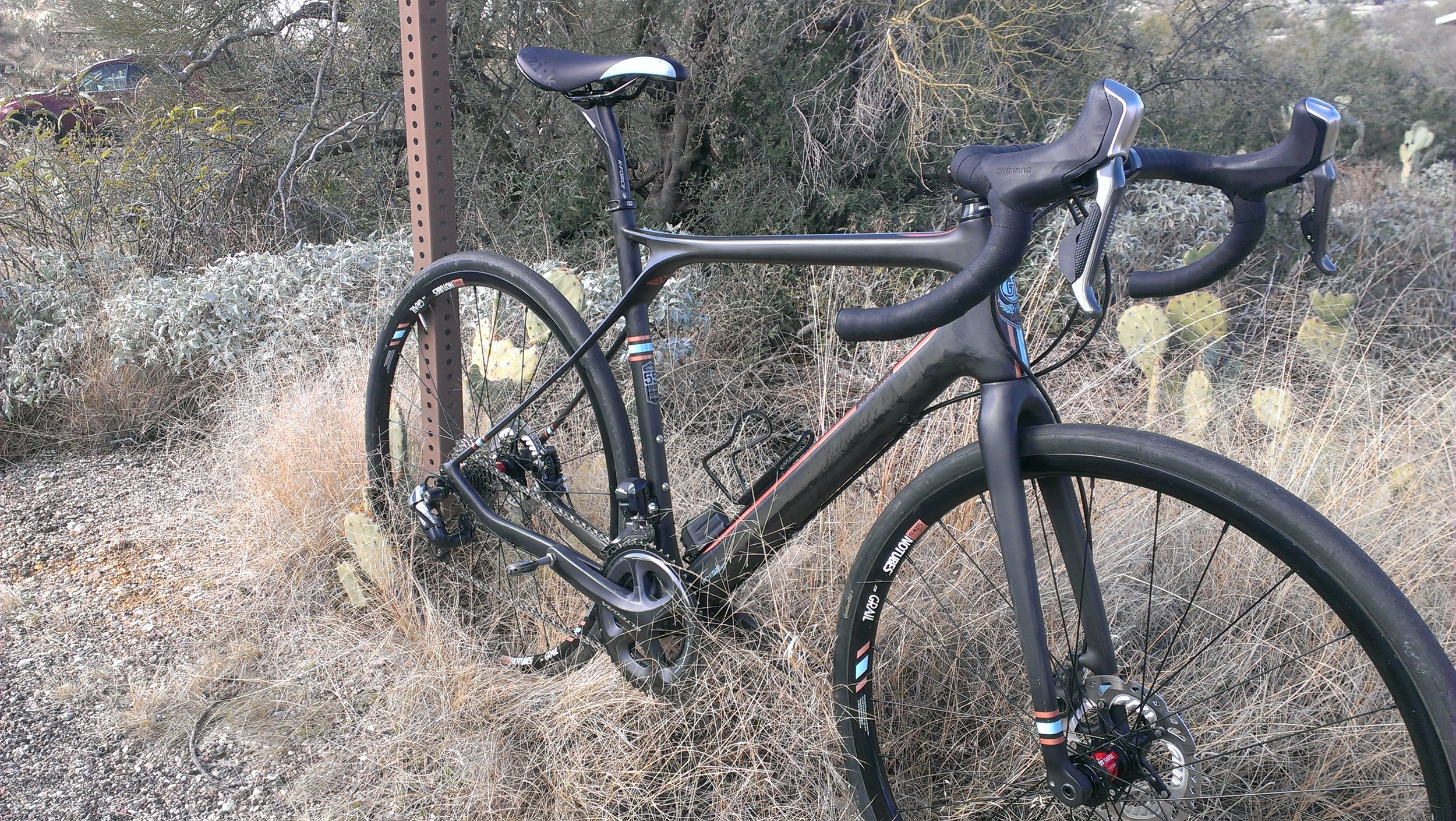By: Forest Dramis
Instead of talking about every road bike ridden at the Bike Test, I've chosen a few of the standout models and one of the disappointing models. As always, these opinions are not those of Outside Magazine or anyone else, just my two cents.
Specialized S-Works Tarmac Disc: For me, this was clearly the standout bike of the Test. I've ridden disc road bikes before, some of them great (Specialized Roubaix Disc), some of them disappointing (Colnago C59 Disc). I found the Tarmac Disc to be nearly perfect. Ride quality and comfort is what I've come to expect from all of Specialized's top-end bikes: exceptional. Stiffness, power transfer and handling were all great, which is to be expected from a bike in this price bracket. The Tarmac had only two drawbacks: price & weight. Price? Welcome to the game. It's a high end bike and that's what they cost. Weight? It's not heavy by any means, but it's heavy for $10,000. Our test bike came in at 16# with Roval carbon wheels. Those two issues aside, it's perfect. It's comfortable enough for a 6 hr ride. It's quick and nimble enough for a crit. It's stiff enough to climb well. And the combination of its handling with its flawless disc brakes makes it the best bike I've ever descended on. Supreme confidence, solidity and control. So good that even I, a confessed weight weenie, wouldn't give up the disc brakes for less weight. The Tarmac clearly represents the future of road bikes.
Weight: 16.02# Price: $10,000
Wilier Zero.9: It seems like every year Wilier sends a bike to the Test is another year a Wilier makes it into the Top 3. Every Wilier I've ever tested has been a standout, from the Cento 1 to the incredible Zero.7, they've all been winners. The Zero.9 continues that tradition. Our test bike was spec'd with the always loved Shimano Ultegra. For anyone on a budget, Ultegra should be the go-to gruppo. Quality, shift performance and reliability is all on par with Dura Ace. It's just a little heavier and considerably cheaper.
GT Grade
Norco Search XR
Norco Search & GT Grade: While I'm not sure where a "gravel bike" fits into one's quiver, there's no denying that gravel bikes have been the fastest growing segment of bike sales on the road side. The two gravel bikes that stood out in the test were the Norco Search and the GT Grade. Basically the same price and same spec, there's not much separating the two. Both bikes were extremely comfortable, owing to their larger tires at lower pressure. Both were great on the road as well as on the trail. While I wouldn't hesitate to do a 'cross race or two on either bike, their handling was noticeably slower than a dedicated 'cross bike. In this case, that's not a drawback as both felt very stable descending rough trail. If you're interested in 'cross, like to ride fire roads and the occasional trail as well as road, you can't do much better than either of these bikes. Throw on some slicks and each would make a great road bike. Swap out for some 'cross tires and head out to the dirt road or single track. Both these bikes are versatile and credible alternatives to a standard road bike and you can't go wrong by placing either in your garage. (Note: The saddle that comes stock on the Norco, while being beautifully color coordinated, is actually a historic relic from the Spanish Inquisition. Legend has it it was used in the interrogation of over 1,100 heretics and was considered one of the most effective torture devices of its time.)
Norco Search XR (Ultegra): $3,700 GT Grade (Ultegra): $3,580
Trek Emonda
Trek Emonda: Sometimes a bike stands out at the test not for being exceptional, but for being exceptionally disappointing. Unfortunately, the Trek Emonda we tested fell into the latter category. Whoever you are, the prospect of riding a 10.3# road bike is exciting. When you then learn it's $15,000 out of the box, it's even more enticing. To say the bike feels light is a staggering understatement. Frankly, it feels invisible. Accelerating up short rollers felt noticeably easier than on any bike I've ever ridden. The 10%+ climb up Gates Pass felt easier than anticipated. When the ride points uphill, it has no peer. Are you filthy rich and just happen to be targeting the Mt. Evans Hill Climb this year? Look no further, your search is over. However, if you're not that guy, look elsewhere. As good as it is on the climbs, it's equally bad everywhere else. Rough road? You'll feel every crack, piece of chip-seal, frost heave, texture and grain of sand. Do you ride longer than 2 hours? Bummer. Your neck will hurt so much from the ultra-short head tube that you'll be packing your jersey full of ibuprofen. Faced with the prospect of descending that mountain pass you just rocketed up? Godspeed. The combination of it's ethereal lightness, super short head tube, odd Bontrager combo bar-stem and stiff TUNE wheels makes it less than stable on the descents. Way, way less than stable. In short, it's a one trick pony. It does that one trick--climbing, extremely well. Better than anything else on the market. But that's all it does well. If you're looking for anything besides a hill climb machine, look elsewhere.





